I always used this solution to enumerate files and folders recursively. The code works very fine showing correct file/folder names to all found. But exists a trouble related to recognition of symbolic link files, making the linked solution fail, for example:
Like you can see on image above, these 3 files are symbolic link files pointing to dll files in some place. Then, executing the code mentioned will prints:
- api-ms-win-core-console-l1-1-0.dll
instead of
- api-ms-win-core-console-l1-1-0.symlink
Another similar case with some use of IoCreateFile() function. If this receive a wrong filename or objectattributes (still referring to code of linked answer), also will fail with a ntstatus error STATUS_OBJECT_PATH_NOT_FOUND or some other related to this trouble.
Then my question is:
Is threre some solution to recognize symbolic link files where the linked code that i had used could work (and also why not any other function like ZwOpenFile etc)?
Thanks in advance by any suggestion.
Edition:
Here is a code where IoCreateFile() function fails when a simbolic link is passed as filename:
#include <ntifs.h>
#include <ntddk.h>
HANDLE
MyIoOpenFile(
IN PCWSTR FileName,
IN ACCESS_MASK DesiredAccess,
IN ULONG ShareAccess)
{
NTSTATUS ntStatus;
UNICODE_STRING uniFileName;
OBJECT_ATTRIBUTES objectAttributes;
HANDLE ntFileHandle;
IO_STATUS_BLOCK ioStatus;
if (KeGetCurrentIrql() > PASSIVE_LEVEL) {
DbgPrint("KeGetCurrentIrql() > PASSIVE_LEVEL\n");
return 0;
}
RtlInitUnicodeString(&uniFileName, FileName);
InitializeObjectAttributes(&objectAttributes, &uniFileName,
OBJ_KERNEL_HANDLE | OBJ_CASE_INSENSITIVE, NULL, NULL);
ntStatus = IoCreateFile(&ntFileHandle,
DesiredAccess,
&objectAttributes,
&ioStatus,
0,
FILE_ATTRIBUTE_NORMAL,
ShareAccess,
FILE_OPEN,
0,
NULL,
0,
0,
NULL,
IO_NO_PARAMETER_CHECKING);
if (!NT_SUCCESS(ntStatus)) {
DbgPrint("IoCreateFile() error - 0x%X \n", ntStatus);
return 0;
}
return ntFileHandle;
}
//---------------------------------------------------------------------------
HANDLE hFileHandle = MyIoOpenFile(L"\\??\\C:\\Full-Path-FileName-Here",
FILE_READ_ATTRIBUTES,
FILE_SHARE_READ);
if (hFileHandle != 0) {
DbgPrint("hFileHandle: %08X\n", hFileHandle);
ZwClose(hFileHandle);
}
